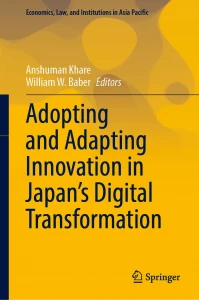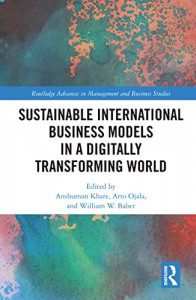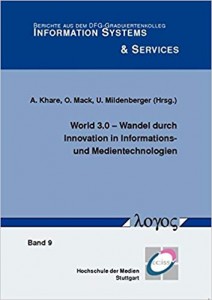Von den Mitgliedern des xm-institutes sind zahlreiche Publikationen zu unterschiedlichen Forschungsergebnissen erschienen. Diese sind hier zusammengefasst. Bei Interesse würden wir uns über eine Bestellung über die Affiliate-Links freuen, da wir so vom Kaufpreis eine kleine Unterstützung zu den Kosten zum Betrieb der Website erhalten.
Sammelbände zu xm-institute Forschungsthemen
Adopting and Adapting Innovation in Japan’s Digital Transformation (2023)
 This book explores how the business transformation taking place in Japan is influenced by the digital revolution. The chapters present approaches and examples from sectors commonly understood to be visible arenas of digital transformation—3D printing and mobility, for instance—as well as some from not-so-obvious sectors, such as retail, services, and fintech.
This book explores how the business transformation taking place in Japan is influenced by the digital revolution. The chapters present approaches and examples from sectors commonly understood to be visible arenas of digital transformation—3D printing and mobility, for instance—as well as some from not-so-obvious sectors, such as retail, services, and fintech.
Business today is facing unprecedented change especially due to the adoption of new, digital technologies, with a noticeable transformation of manufacturing and services. The changes have been brought by advanced robotics, the emergence of artificial intelligence, and digital networks that are growing in size and capability as the number of connected devices explodes. In addition, there are advanced manufacturing and collaborative connected platforms, including machine-to-machine communications. Adoption of digital technology has caused process disruptions in both the manufacturing and services sectors and led to new business models and new products.
While examining the preparedness of the Japanese economy to embrace these changes, the book explores the impact of digitally influenced changes on some selected sectors from a Japanese perspective. It paints a big picture in explaining how a previously manufacturing-centric, successful economy adopts change to retain and rebuild success in the global environment. Japan as a whole is embracing, yet also avoiding—innovating but also restricting—various forms of digitalization of life and work. The book, with its 12 chapters, is a collaborative effort of individuals contributing diverse points of view as technologists, academics, and managers.
- Presents spiking interest in Japan in recent years in the business world and academia
- Illustrates how Japan attracts attention due to super-aging, high technologies, and global role in industry
- Explores unique practices and experiences of Japan
Sustainable International Business Models in a Digitally Transforming World (2022 – Routledge Advances in Management and Business Studies) (English Edition)
 The forces of volatility, uncertainty, complexity and ambiguity (VUCA) in today’s world are shaping businesses and calling into question the wisdom of existing business models. VUCA challenges businesses to digitalize and transform in ways they had not contemplated before. This book looks at how successful businesses have revitalized and innovated their business models. It illustrates through cases how these businesses have adapted to new forms of globalization through the lens of Business Model Innovation (BMI) theories in a digital world.
The forces of volatility, uncertainty, complexity and ambiguity (VUCA) in today’s world are shaping businesses and calling into question the wisdom of existing business models. VUCA challenges businesses to digitalize and transform in ways they had not contemplated before. This book looks at how successful businesses have revitalized and innovated their business models. It illustrates through cases how these businesses have adapted to new forms of globalization through the lens of Business Model Innovation (BMI) theories in a digital world.
This book’s chapters are divided into three sections. The first section examines the existing literature, the second section focuses on business processes and behaviour, and lastly the third section presents four case studies of sustainable international businesses from sectors such the fashion and digital services industry. Paying attention to business decisions and outcomes, the contributors critically examine which theories and practices would be most applicable for a digitally transforming world.
This book provides insights that will interest researchers and academics in the fields of sustainable business, organizational change, and digital transformation, amongst others. Its observations into sustainable digital transformation may also interest business leaders and consultants.
Transforming Japanese Business: Rising to the Digital Challenge (2019)

This book explores how the business transformation taking place in Japan is influenced by the digital revolution. The chapters present approaches and examples from sectors commonly understood to be visible arenas of digital transformation―3D printing and mobility, for instance―as well as some from not-so-obvious sectors, such as retail, services, and fintech.
Business today is facing unprecedented change especially due to the adoption of new, digital technologies, with a noticeable transformation of manufacturing and services. The changes have been brought by advanced robotics, the emergence of artificial intelligence, and digital networks that are growing in size and capability as the number of connected devices explodes. In addition, there are advanced manufacturing and collaborative connected platforms, including machine-to-machine communications. Adoption of digital technology has caused process disruptions in both the manufacturing and services sectors and led to new business models and new products.
While examining the preparedness of the Japanese economy to embrace these changes, the book explores the impact of digitally influenced changes on some selected sectors from a Japanese perspective. It paints a big picture in explaining how a previously manufacturing-centric, successful economy adopts change to retain and rebuild success in the global environment. Japan as a whole is embracing, yet also avoiding―innovating but also restricting―various forms of digitalization of life and work. The book, with its 12 chapters, is a collaborative effort of individuals contributing diverse points of view as technologists, academics, and managers.
- Discusses how Japanese business landscape is changing with the emergence of digital technology and what practices are succeeding
- Informs how Japanese industry is adapting, or not, to changes in digital technology. Exposes gaps and strengths in digitalization in Japan
- Presents theoretical and practical cases from Japan that will inform business and academic readers
On the Line: Business Education in the Digital Age (2018)
 This book presents different perspectives of online business education – how it is designed, delivered and how it supports advances in management disciplines. The authors describe online platforms in their provision of timely, excellent and relevant business education. The book starts by examining the emergence of online business education. It offers insights for use to business educators in design and implementation of online learning. It presents and discusses technologies for class facilitation and collaboration including tools used to bring content and issues to life. Disruptive approaches and new directions in online business education are examined. The book is ideal for business educators, administrators, as well as business practitioners that have an interest in delivering high quality business education using online platforms and tools.
This book presents different perspectives of online business education – how it is designed, delivered and how it supports advances in management disciplines. The authors describe online platforms in their provision of timely, excellent and relevant business education. The book starts by examining the emergence of online business education. It offers insights for use to business educators in design and implementation of online learning. It presents and discusses technologies for class facilitation and collaboration including tools used to bring content and issues to life. Disruptive approaches and new directions in online business education are examined. The book is ideal for business educators, administrators, as well as business practitioners that have an interest in delivering high quality business education using online platforms and tools.
On the Line: Business Education in the Digital Age is divided into three sections. Section 1 presents papers on “why” business education is viable and sustainable in today’s context. Treating education as a service, this section describes new techniques for creating a better online business education experience. It also looks at the role advanced data analytics can play in enhancing the quality of online business education. Section 2 delves into “how” online business education works. It presents conceptual models for teaching in specific disciplines, learning design that describes what business educators do and how programs work. This section also addresses performance assessments and quality assurance measures that help to demonstrate the efficacy of online pedagogy. Practical applied papers are used in this section to highlight the use of learning platforms, tools and their application specific to businesses that build knowledge and skills and make students ‘work ready’. Finally Section 3 of the book addresses the “so what?” or the outcomes and impacts of online business education. This section targets where business education needs to take learning next, for example to support sustainable business, ethical decision making and inclusive and collaborative leadership. Chapters deal with topics such as how distributed online environments may work better to support knowledge and soft skill building directly relevant for organizations today. Other learning outcomes showing the value of online business education are discussed.
Academics, alumni and consultants from over fifteen institutions and organizations around the world contributed to this book.
Phantom Ex Machina: Digital Disruption’s Role in Business Model Transformation (2017)
 This book explores the factors that make digital disruption possible and the effects this has on existing business models. It takes a look at the industries that are most susceptible to disruption and highlights what executives can do to take advantage of disruption to re-invent their business model. It also examines the pivotal role that technology plays in creating new dynamics to business operations and forcing business model changes. Adoption of digital technology has caused process disruptions in a number of industries and led to new business models (e.g., Über, AirBnb) and new products. In addition to covering some of the more popular and well known examples, this book targets not so obvious disruptions in the education sector and in services and changing business models.
This book explores the factors that make digital disruption possible and the effects this has on existing business models. It takes a look at the industries that are most susceptible to disruption and highlights what executives can do to take advantage of disruption to re-invent their business model. It also examines the pivotal role that technology plays in creating new dynamics to business operations and forcing business model changes. Adoption of digital technology has caused process disruptions in a number of industries and led to new business models (e.g., Über, AirBnb) and new products. In addition to covering some of the more popular and well known examples, this book targets not so obvious disruptions in the education sector and in services and changing business models.
Phantom Ex Machina: Digital Disruption’s Role in Business Model Transformation is divided into six parts. The book begins with an introduction to digital disruption and why it matters. The next part of the book focuses on business strategy which includes case studies on the impact of social media and how digital disruption changes pricing strategies and price models. For part three, the authors observe technology’s role in digital disruptions. Chapters cover how 3D printing is challenging existing business models and how the automotive industry is innovating with new perspectives. Part four covers higher education, recognizing digital disruption’s transformation in graduate management education. Part five centers upon the service industry with a look at virtual teams and the emergence of virtual think tanks. Finally the book concludes with a look to the future, embracing disruptions.
Managing in a VUCA World (2016)
 This book examines volatility, uncertainty, complexity and ambiguity (VUCA) and addresses the need for broader knowledge and application of new concepts and frameworks to deal with unpredictable and rapid changing situations. The premises of VUCA can shape all aspects of an organization. To cover all areas, the book is divided into six sections. Section 1 acts as an introduction to VUCA and complexity. It reviews ways to manage complexity, while providing examples for tools and approaches that can be applied. The main focus of Section 2 is on leadership, strategy and planning. The chapters in this section create new approaches to handle VUCA environments pertaining to these areas including using the Tetralemma logics, tools from systemic structural constellation (SySt) approach of psychotherapy and organizational development, to provide new ideas for the management of large strategic programs in organizations. Section 3 considers how marketing and sales are affected by VUCA, from social media’s influence to customer value management. Operations and cost management are highlighted in Section 4. This section covers VUCA challenges within global supply chains and decision-oriented controlling. In Section 5 organizational structure and process management are showcased, while Section 6 is dedicated to addressing the effects of VUCA in IT, technology and data management. The VUCA forces present businesses with the need to move from linear modes of thought to problem solving with synthetic and simultaneous thinking. This book should help to provide some starting points and ideas to deal with the next era. It should not be understood as the end of the road, but as the beginning of a journey exploring and developing new concepts for a new way of management.
This book examines volatility, uncertainty, complexity and ambiguity (VUCA) and addresses the need for broader knowledge and application of new concepts and frameworks to deal with unpredictable and rapid changing situations. The premises of VUCA can shape all aspects of an organization. To cover all areas, the book is divided into six sections. Section 1 acts as an introduction to VUCA and complexity. It reviews ways to manage complexity, while providing examples for tools and approaches that can be applied. The main focus of Section 2 is on leadership, strategy and planning. The chapters in this section create new approaches to handle VUCA environments pertaining to these areas including using the Tetralemma logics, tools from systemic structural constellation (SySt) approach of psychotherapy and organizational development, to provide new ideas for the management of large strategic programs in organizations. Section 3 considers how marketing and sales are affected by VUCA, from social media’s influence to customer value management. Operations and cost management are highlighted in Section 4. This section covers VUCA challenges within global supply chains and decision-oriented controlling. In Section 5 organizational structure and process management are showcased, while Section 6 is dedicated to addressing the effects of VUCA in IT, technology and data management. The VUCA forces present businesses with the need to move from linear modes of thought to problem solving with synthetic and simultaneous thinking. This book should help to provide some starting points and ideas to deal with the next era. It should not be understood as the end of the road, but as the beginning of a journey exploring and developing new concepts for a new way of management.
World 3.0 – Wandel durch Innovation in Informations- und Medientechnologien (2010)
 Die rasante Weiterentwicklung von Informationstechnologien in der letzten Dekade sowie die zunehmend innovative Gestaltung von Geschäftsmodellen auf Basis digitaler Technologien macht die Frage spannend “welche IT-Technologien die Geschäfts- und linebreak Alltagswelt von morgen prägen und in welcher Art die Technologien die Geschäfts- und Alltagswelt verändern werden?” Vor diesem Hintergrund ist der vorliegende, zweisprachig konzipierte Sammelband zu sehen. Der Sammelband beinhaltet Beiträge von Wissenschaftlern und Praktikern, die die oben aufgeworfene Frage aus völligen unterschiedlichen Perspektiven und mit unterschiedlichen Fachhintergründen beantworten. Die Bandbreite reicht dabei von Beiträgen, die technische Aspekte der Informationstechnologie in den Vordergrund stellen, über Beiträge, die sich primär mit den durch die Entwicklung der Informationstechnologie ausgelösten Veränderungen für Geschäftsmodelle im Medienbereich auseinandersetzen bis zu Beiträgen, die Herausforderungen der technologischen Entwicklungen für die medienorientierte Forschung diskutieren.
Die rasante Weiterentwicklung von Informationstechnologien in der letzten Dekade sowie die zunehmend innovative Gestaltung von Geschäftsmodellen auf Basis digitaler Technologien macht die Frage spannend “welche IT-Technologien die Geschäfts- und linebreak Alltagswelt von morgen prägen und in welcher Art die Technologien die Geschäfts- und Alltagswelt verändern werden?” Vor diesem Hintergrund ist der vorliegende, zweisprachig konzipierte Sammelband zu sehen. Der Sammelband beinhaltet Beiträge von Wissenschaftlern und Praktikern, die die oben aufgeworfene Frage aus völligen unterschiedlichen Perspektiven und mit unterschiedlichen Fachhintergründen beantworten. Die Bandbreite reicht dabei von Beiträgen, die technische Aspekte der Informationstechnologie in den Vordergrund stellen, über Beiträge, die sich primär mit den durch die Entwicklung der Informationstechnologie ausgelösten Veränderungen für Geschäftsmodelle im Medienbereich auseinandersetzen bis zu Beiträgen, die Herausforderungen der technologischen Entwicklungen für die medienorientierte Forschung diskutieren.
Weitere Bücher von oder mit Beteiligung unserer xm-institute Mitglieder
Mack, O. (2003), Konfiguration und Koordination von Unternehmungsnetzwerken – Ein allgemeines
Netzwerkmodell, zugl. Diss. Universität Mainz, Gabler: Wiesbaden 2003.
Mack, O. (2015). Managing Change Programmes, in: Lock, D./ Wagner, R. (eds.). Handbook of Programme Management, 2nd edition, Routledge:London
Khare, A., & Beckman, T. (Eds.). (2013). Mitigating Climate Change: The Emerging Face of Modern Cities. Springer Science & Business Media.
Kersten, W., & Wittmann, J. (Eds.). (2013). Kompetenz, Interdisziplinarität und Komplexität in der Betriebswirtschaftslehre: Festgabe für Klaus Bellmann zum 70. Geburtstag. Springer-Verlag.
Junge, K., Mildenberger, U., & Wittmann, J. (Eds.). (2003). Perspektiven und Facetten der Produktionswirtschaft: Schwerpunkte der Mainzer Forschung. Springer-Verlag.
Baber, W. W., & Fletcher-Chen, C. C. (2015). Practical Business Negotiation. Routledge.
Beeck, V., Becker, H. P., Himpel, F., Kuß, A., Mack, O., Mülder, W., & Wambach, J. (2013). Gablers Wirtschaftswissen für Praktiker: Zuverlässige Orientierung in allen kaufmännischen Fragen. Springer-Verlag.
Ausgewählte Artikel und Beiträge von Dr. Oliver Mack
Mack, O. (forthcoming). Die integrierte Entwicklung und Gestaltung digital-nachhaltiger Geschäftsmodelle. in: Fesidis, B./ Röß, S./ Rummel, S. (Hrsg.) (forthcoming). Nachhaltige Digitalisierung. Springer.
Mack, O. (2023). Agile Organisationsdesigns in Zeiten digitaler Transformation. in: Hippe, A./ Wirsam, J. (Hrsg.) (2023). Nachhaltigkeit und Innovation in internen und externen Unternehmensbeziehungen – Festschrift für Prof. Dr. Klaus Bellmann zum 80. Geburtstag. Springer.
Mack, O. (2022). Leading Organizations as Living Systems: Survival and Sustainable Evolution in Ecosystems. in: Khare, A./ Ojala, A./ Baber, W. (2022). Sustainable International Business Models in a Digitally Transforming World. Routledge: New York. S. 36-51.
Mack, O., Köppl, L. (2020), Auf der Talfahrt wenden – Den Wandel in Krisensituationen gestalten, in: Zeitschrift für Organisationsentwicklung 1/2020, S. 34-40
Mack, O./ Veil, P. (2017), Platform Business Models and Internet of Things as Complementary Concepts for Digital Disruption, in: Khare, A./ Stewart, B./ Schatz, R. (eds) (2016), Phantom ex machina – Digital Disruption’s Role in Business Model Transformation, Springer: New York (2016)
Mack, O./ Brugger, S. (2017), Cultural Communication Patterns – A way how management and engineering can improve their mutual understanding significantly, in: Khare, A./ Stewart, B./ Schatz, R. (eds) (2016), Phantom ex machina – Digital Disruption’s Role in Business Model Transformation, Springer: New York (2016)
Mack, O. (2015). Managing Change Programmes, in: Lock, D./ Wagner, R. (eds.). Handbook of Programme Management, 2nd edition, Routledge:London
Mack, O./ Khare, A. (2015), Perspectives on a VUCA world, in: Mack, O./ Khare, A. et al. , Managing in a VUCA World, Springer, New York 2015
Mack, O./ Jungen, M. (2015), Program Management in VUCA Environments: Theoretical and Pragmatical Thoughts on a Systemic Management of Projects and Programs, in: Mack, O./ Khare, A. et al. , Managing in a VUCA World, Springer, New York 2015
Mack, O./ Paul, M. (2012), Risikofaktor Projekt (3) – Projekte im Krisenmodus, in: Der Aufsichtsrat Aktuell, Heft 3, 2012
Mack, O./ Paul, M. (2012), Risikofaktor Projekt (2) – Projekte im Alltagsmodus, in: Der Aufsichtsrat Aktuell, Heft 2, 2012
Mack, O./ Paul, M. (2012), Risikofaktor Projekt (1) – Ein Thema für Aufsichtsräte !?, in: Der Aufsichtsrat Aktuell, Heft 1, 2012
Mack, O. (2012), GOFI – Die GLOBArt Global Online Freedom Initiative – Erfahrungen, in: GLOBArt (Hrsg.), Im Sinne der Freiheit, Wien/ New York 2012
Mack, O. (2011), Web 3.0 – Wie verändert das Internet unsere Welt, in: GLOBArt (Hrsg.), Wendezeit – Bausteine für einen anderen Fortschritt, Wien/ New York 2011, S. 66-79
Mack, O./ Haritz, A. (2008), Kompetenzentwicklung in Unternehmensnetzwerken – Eine spieltheoretische Betrachtung, in: Festschrift für Prof. Klaus Bellmann, Gabler: Wiesbaden 2008
Mack, O./ Mayo, M.C./ Khare, A. (2005), A Strategic Approach for Successful CRM: A European Perspective, in: Problems & Perspectives in Management, Vol. 2, No. 3, 2005, S. 98-106
Mack, O. (2004), Kapitel “Aufbauorganisation”, in: Irgel (Hrsg.), Gablers Wirtschaftswissen für Kaufleute, 5. Aufl., Wiesbaden 2004.
Mack, O. (2004), Kapitel “Planung”, in: Irgel, L. (Hrsg.), Gablers Wirtschaftswissen für Kaufleute, 5. Aufl., Wiesbaden 2004.
Mack, O./ Mildenberger, U. (2003), “Customer Solutions” – Merkmale und Erscheinungsformen von Kundenlösungen, in: Moderne Produktionskonzepte für Güter- und Dienstleistungsproduktionen, TCW Transfer-Centrum, München 2003, p. 61-81
Mack, O. (2002), CRM-Diamond, in: Database Marketing, 4/2002, S. 7-11.
Mack, O./ Mildenberger, U. (2002), Funktionsmechanismen und Erfolgsfaktoren der New Economy, in: Dangelmaier, W. u.a. (Hrsg.), Modelle im E-Business, Paderborn 2002, S. 39-60.
Mack, O./ Bellmann, K./ Zuber, P. (2002), Managing Economic Uncertainty in Early Stages of R&D- Projects, in Grote, R.; Antranikian, G. (Hrsg.): biocat 2002 – first international congress on Biocatalysis (book of abstracts), Hamburg, Germany, July 28-31, 2002, S. 218 ff.
Mack, O./ Mildenberger, U. (2000), Management von Servicequalität in der Tourismusindustrie, in: TÜV Nordrhein-Westfalen – Gläbe, R./ Thomann, H.J. (Hrsg.), Qualitätsmanagement in Dienstleistungsunternehmen, Köln 2000, Ergänzungslieferung.
Mack, O./ Mildenberger, U. (1998), Kundenorientierung durch professionelles Qualitätsmanagement am Beispiel eines Reiseveranstalters, in: Database Marketing, 1998, H. 3,
S. 22-25.
Mack, O. (1997), Virtuelle Unternehmen und Database Marketing, in: Link, J. u.a. (Hrsg.), Handbuch Database Marketing, 2. Aufl., Ettlingen 1997, S. 569-581. (Coautor: Bellmann, K.)
Mack, O./ Späth, P. (1997), Kernkompetenzen systematisch ausschöpfen, in: Betriebswirtschaftliche Blätter, 46. Jg., 1997, H. 5, S. 240-243.

